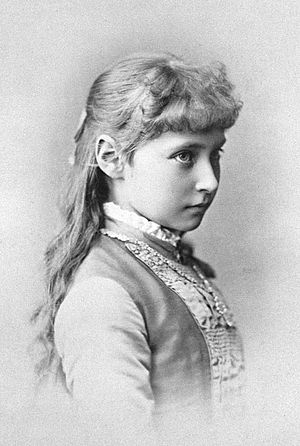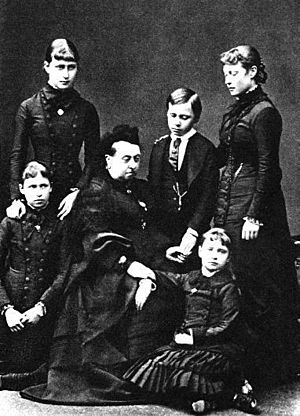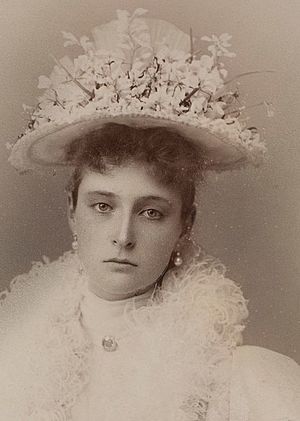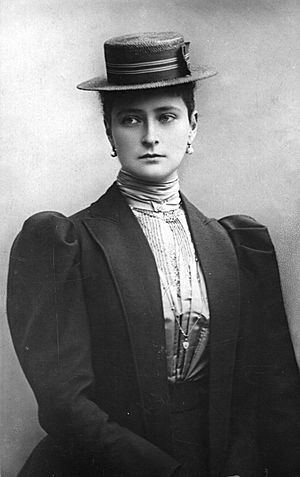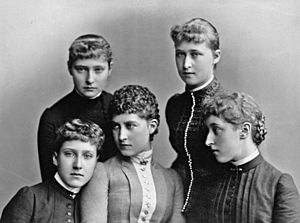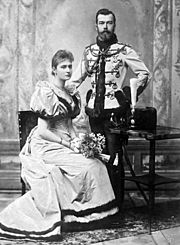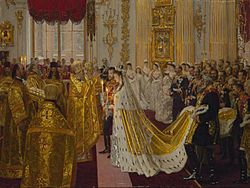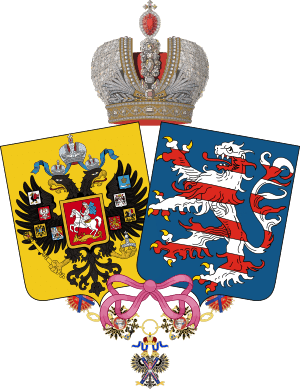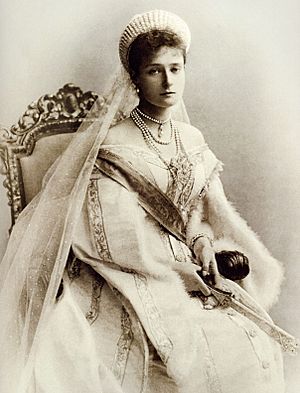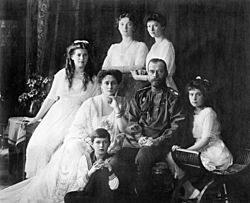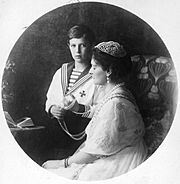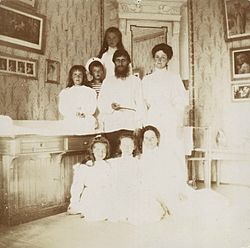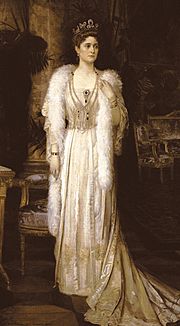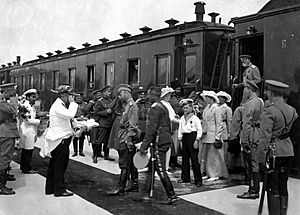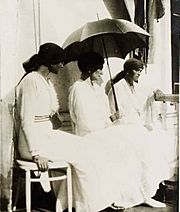Alexandra Feodorovna (Alix of Hesse) facts for kids
Quick facts for kids Alexandra Feodorovna |
|||||
|---|---|---|---|---|---|
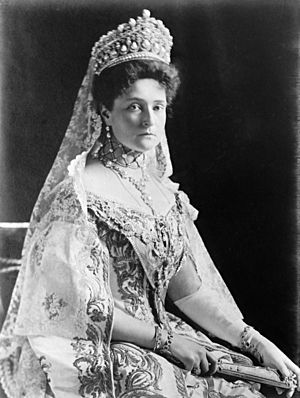
Photograph by Boasson and Eggler, 1908
|
|||||
| Empress consort of Russia | |||||
| Tenure | 26 November 1894 – 15 March 1917 | ||||
| Coronation | 26 May 1896 | ||||
| Born | Princess Alix of Hesse and by Rhine 6 June [O.S. 25 May] 1872 New Palace, Darmstadt, Grand Duchy of Hesse, German Empire |
||||
| Died | 17 July 1918 (aged 46) Ipatiev House, Yekaterinburg, Russian SFSR |
||||
| Burial | 17 July 1998 Peter and Paul Cathedral, Saint Petersburg, Russian Federation |
||||
| Spouse | |||||
| Issue | |||||
|
|||||
| House | Hesse-Darmstadt | ||||
| Father | Louis IV, Grand Duke of Hesse and by Rhine | ||||
| Mother | Alice of the United Kingdom | ||||
| Religion | Russian Orthodox prev. Lutheranism |
||||
| Signature | |||||
| Saint Alexandra Romanova of Russia | |
|---|---|
| Saint, Passion-Bearer, Tsaritsa | |
| Venerated in | Eastern Orthodoxy |
| Canonized |
|
| Major shrine | Church on Blood, Yekaterinburg, Russia |
| Feast | 17 July |
Alexandra Feodorovna (born Princess Alix of Hesse and by Rhine on 6 June 1872) was the last Empress of Russia. She was married to Emperor Nicholas II. Their marriage took place on 26 November 1894. She remained Empress until Nicholas II was forced to give up his throne on 15 March 1917.
Alexandra was a favorite granddaughter of Queen Victoria of the United Kingdom. Like her grandmother, she carried the gene for haemophilia. This meant her son, Alexei, inherited the condition. Her strong belief in the Russian mystic Grigori Rasputin and her encouragement of her husband's absolute rule made her unpopular. This also harmed the Romanov monarchy. She and her family were killed by the Bolsheviks in 1918 during the Russian Revolution. In 2000, the Russian Orthodox Church declared her a saint. She is known as Saint Alexandra the Passion Bearer.
Contents
Empress Alexandra's Life and Personality
Early Life and Family
Alexandra was born on 6 June 1872 in Darmstadt, Germany. Her birth name was Princess Alix Viktoria Helene Luise Beatrix of Hesse and by Rhine. She was the sixth child of Louis IV, Grand Duke of Hesse, and Princess Alice of the United Kingdom. Her mother was the daughter of Queen Victoria.
Alix was baptized into the Protestant Lutheran Church. Her mother called her "Sunny" because she was cheerful. Her British relatives called her "Alicky" to tell her apart from her aunt, Alexandra of Denmark.
Alix's older brother, Friedrich, had hemophilia. He died in 1873 after a fall. In 1878, diphtheria spread through her family. Alix, her three sisters, her brother, and her father became sick. Her mother, Princess Alice, cared for them. Alice also became sick and died on 14 December 1878. Alix was only six years old. Her younger sister, Marie, also died.
After her mother's death, Queen Victoria became like a second mother to Alix. Victoria made sure Alix had good teachers. She invited Alix and her siblings to England for holidays. They became close to their British cousins. Alix saw Queen Victoria as "the best and dearest of grandmamas."
In March 1892, Alix's father, Grand Duke Louis IV, died. Alix was 19 years old. This was a very sad time for her.
Personality and Appearance
Alexandra was known for her beauty. Her grandmother, Queen Victoria, called her "a most lovely child." She was tall and had beautiful golden-red hair. Her eyes were deep gray and very bright.
Alexandra was very shy. She found social events difficult. When she was Empress, people noticed she was nervous when talking to others. Her face would sometimes get red spots. This shyness was often mistaken for being proud or unfriendly. Her daughters' tutor, Pierre Gilliard, said her shyness was a "mask covering her sensitiveness."
Even when she was young, Alexandra was serious. Her cousin, Princess Marie Louise of Schleswig-Holstein, said Alix had "a curious atmosphere of fatality."
Alexandra was very religious. She loved Nicholas II. But at first, she did not want to marry him because she would have to leave the Lutheran faith. She told Nicholas that converting to the Russian Orthodox Church would be "a wrongful thing."
Alexandra was kind to her friends. She enjoyed helping others. She said, "I want to help others in life, to help them to fight their battles." She also loved to read and enjoyed music. She played the banjo and piano.
Engagement to Nicholas II
In 1884, 12-year-old Alix met 16-year-old Grand Duke Nicholas at her sister Elisabeth's wedding in Russia. Nicholas was the heir to the Russian throne. Nicholas wrote in his diary that he loved Alix.
In 1890, Alix visited her sister in Russia again. She and Nicholas spent time together. Nicholas wrote, "It is my dream to one day marry Alix H."
Nicholas's parents, Emperor Alexander III and Empress Maria Feodorovna, did not want Nicholas to marry Alix. They preferred a French princess. But Nicholas was determined to marry Alix.
In April 1894, Nicholas proposed to Alix. She cried and refused because she did not want to change her religion. Her sister, Elisabeth, talked to Alix. Elisabeth explained that she did not have to completely give up her Lutheran faith to become Orthodox. The next day, Alix accepted Nicholas's proposal.
After their engagement, Alix returned to England. Nicholas visited her. Alix wrote that she was "more happy than words can express."
In September 1894, Alexander III's health was failing. He allowed Nicholas to bring Alix to the Livadia Palace in Crimea. The dying Tsar gave them his blessing.
Empress of Russia
Wedding and Coronation
On 1 November 1894, Alexander III died. Nicholas became Tsar Nicholas II. The next day, Alix joined the Russian Orthodox Church and became Grand Duchess Alexandra Feodorovna.
Alexandra and Nicholas married on 26 November 1894 in Saint Petersburg. Many Russians saw Alexandra's arrival as a bad sign because it happened so soon after the Emperor's death. Alexandra herself felt their wedding was like a continuation of the funeral.
Their coronation took place on 14 May 1896 in Moscow. Half a million Russians gathered to celebrate. Sadly, there was a terrible accident at Khodynka Field. Rumors of not enough food caused a rush, and a thousand people were trampled to death.
Nicholas and Alexandra were very upset. But they were advised to attend a ball that evening so as not to offend the French ambassador. This decision made many Russians believe the new Tsar and his "German woman" were heartless.
Challenges as Empress
Alexandra was not popular with the Russian people. Her shyness was seen as arrogance. She found it hard to make friends. She spoke English and German well, but struggled with French and Russian. She learned Russian, but spoke with a strong accent.
Alexandra did not enjoy the social duties of an Empress. She disliked the gossip at court parties. She removed names of people she thought were scandalous from guest lists. Many in St. Petersburg society thought she was too strict.
She also had a difficult relationship with her mother-in-law, Empress Maria Feodorovna. Russian tradition gave the Dowager Empress higher rank. Maria also refused to give Alexandra the crown jewels at first.
Alexandra was unpopular within the Imperial family too. She believed the Tsar should have absolute power. She preferred to be alone with Nicholas. This made other family members feel cut off from the Tsar.
Alexandra believed the Russian people automatically loved their Emperor and Empress. She did not try to win their affection. Queen Victoria advised her to try to win her subjects' love, but Alexandra disagreed. She believed Russia was different from England.
Struggle for an Heir
On 15 November 1895, Alexandra gave birth to her first child, a daughter named Olga. Many Russians were disappointed because they wanted a son. According to Russian law, only a male could inherit the throne.
Alexandra had a miscarriage a few months later. On 10 June 1897, she had another daughter, Tatiana. Nicholas was happy, but his family was worried. Alexandra cried, "My God, it is again a daughter."
On 26 June 1899, her third daughter, Maria, was born. Queen Victoria wrote that she regretted "the third girl for the country." Russians saw this as a sign of bad luck.
On 18 June 1901, Anastasia, her fourth daughter, was born. Nicholas's sister exclaimed, "My God! What a disappointment!… a fourth girl!" People began to say that Alexandra was "not beloved in heaven."
Alexandra and Nicholas turned to faith for help. They met a mystic named Philippe Nizier-Vachot. He claimed he could use his powers to help her have a boy. In 1901, Alexandra seemed pregnant again, and Philippe said it was a boy. But it turned out she was not pregnant.
In 1903, Alexandra and Nicholas supported making Seraphim of Sarov a saint. Philippe told them Seraphim would grant Alexandra a son. On 19 August, they bathed in a sacred spring and prayed for a son.
On 12 August 1904, Alexandra gave birth to Alexei Nikolaevich. He was their only son and the heir to the throne. His birth made Nicholas and Alexandra believe even more in Philippe.
Relationship with Her Children
Alexandra had a somewhat distant relationship with her eldest daughter, Olga. She relied on Olga to help manage her younger siblings. Olga sometimes felt her mother had little time for her.
Alexandra was closest to her second daughter, Tatiana. Tatiana looked and acted most like her mother. She was quiet and very loyal to Alexandra.
Maria sometimes felt insecure. Alexandra often reassured her, "Sweet child you must promise me never again to think that nobody loves you."
Anastasia was lively and mischievous, very different from her mother. She was called the shvibzik (imp). Anastasia was the only one who could make Alexandra laugh during their last months.
Alexandra loved Alexei deeply because he was her only son and the heir. Their tutor, Pierre Gilliard, said Alexei was "the centre of a united family." Alexandra was very protective of him due to his illness. She would sit by his bedside for days during his attacks. She spoiled him and rarely punished him.
Despite her worries about having a son, Alexandra loved all her daughters. She called them her "little four-leaved clover" and "the apostles of God."
Health and Rasputin's Influence
Alexandra's health was often poor. She had many pregnancies, which tired her. She often stayed in bed or on a couch. This also helped her avoid social events she disliked. She was often tired and slept poorly.
Shortly after Alexei's birth, doctors discovered he had haemophilia. This meant his blood did not clot properly, leading to dangerous bleeding. Haemophilia was common in European royal families due to Queen Victoria's descendants. Alexandra's brother and uncle had died young from it.
Alexandra felt very guilty that she had passed the disease to her son. She prayed constantly for him. The family kept Alexei's condition a secret from the Russian people.
Grigori Rasputin, a peasant from Siberia, seemed to have a way to help Alexei. He would pray for him, and Alexei's bleeding would often stop. Alexandra came to believe that Rasputin was the only one who could save her son. Rasputin told her, "If I am not there to protect you, you will lose your son."
Alexandra ignored any negative stories about Rasputin. Nicholas also felt he could not send Rasputin away, fearing Alexei might die. Rasputin's presence at court caused much gossip and damaged the monarchy's reputation.
In 1912, Alexei had a severe bleeding episode in his thigh. Doctors expected him to die. Alexandra sent a telegram to Rasputin, who replied, "The Little One will not die." To the doctors' surprise, Alexei recovered. After this, Alexandra relied on Rasputin even more. His influence became a serious problem during World War I.
Rasputin was killed on 30 December 1916 by a group of nobles. They wanted to end his influence in politics.
World War I and Revolution
War and Unpopularity
When World War I began, Russia fought against Germany. Alexandra had German family ties. Her brother ruled Hesse, and the German Emperor, Wilhelm II, was her cousin. This made her even more unpopular in Russia. People wrongly accused her of helping Germany. There were rumors she was talking to Wilhelm II to arrange a peace deal.
Alexandra was a strong Russian patriot. She worked as a nurse for wounded soldiers, but her efforts were not appreciated by the public.
In 1915, Nicholas II went to the front lines to lead the army. He left Alexandra in charge of the government in Saint Petersburg. During this time, it seemed Alexandra appointed and fired ministers based on Rasputin's advice. She changed prime ministers and other ministers very often. This caused instability in the government.
Alexandra strongly believed in absolute rule for the Tsar. She told Nicholas he must never give up his power. She advised him to "Be Peter the Great, Ivan the Terrible—crush them all." She disliked the Duma (the elected legislature) and thought they should not discuss government matters.
Many in the Imperial family worried about Alexandra's influence and Rasputin's role. They tried to convince her and Nicholas to send Rasputin away, but they failed.
The 1917 Revolution
World War I put huge stress on Russia. There were food shortages and hunger, especially in cities. Many men were fighting in the war, so there were fewer farmers. Transportation was used for the war, making it hard to get food to cities. Prices went up. People were angry about the war and the government.
Nicholas II taking command of the army was a bad decision. He was blamed for all losses. Leaving Alexandra in charge also weakened the monarchy. People believed the German-born Empress was helping Germany.
By March 1917, conditions were terrible. Workers went on strike, and people rioted for bread in Saint Petersburg. The Tsar ordered the army to stop the riots, but soldiers joined the rebellion instead. This started the February Revolution.
The Duma told the Tsar he must give up his throne. Nicholas tried to return to Saint Petersburg, but his train was stopped. After talking to his generals, he gave up the throne for himself and his son, Alexei.
Alexandra was now in a very dangerous situation. The Provisional Government placed her and her children under house arrest at the Alexander Palace. On 22 March, Nicholas joined them. Alexandra told him that he was more important to her as a husband and father than as an Emperor.
Imprisonment and Execution
Life in Captivity
The Provisional Government kept the family under house arrest. They hoped to send the family to Great Britain, but George V, Nicholas and Alexandra's cousin, refused. He was worried about their unpopularity in his own country. France also seemed unwilling to take them.
In August 1917, the family was moved to Tobolsk in Siberia. This was done to keep them safe from the growing violence in the capital. Tobolsk was a calmer place.
After the October Revolution in November 1917, the Bolsheviks took power. This made the family's situation much worse.
In 1918, they were moved again to Yekaterinburg. Nicholas, Alexandra, and their daughter Maria arrived at the Ipatiev House on 30 April 1918. They were ordered to open all their luggage. Alexandra objected, but had to give in. On her bedroom window, she drew a swastika, her good luck symbol. In May, the rest of the family arrived.
Life at the Ipatiev House was full of fear. The family never knew what would happen next. They had few privileges. They could exercise for an hour each day in the garden. Alexei, who could not walk, was carried by his sailor, Nagorny. Alexandra often stayed in her wheelchair, reading the Bible. They received little mail and only old newspapers.
Execution
On 4 July 1918, Yakov Yurovsky, a loyal Bolshevik, became the new commandant of the Ipatiev House. He made security tighter. He collected all the family's jewelry and valuables. Alexandra kept only two bracelets given to her as a child. She and her daughters had hidden diamonds and other jewels in their clothes.
On 16 July 1918, the day passed normally. Nicholas and his daughters took their usual walk. That evening, Yurovsky gathered his men and told them, "Tonight, we shoot the entire family, everybody." Nicholas and Alexandra went to bed at 10:30 p.m.
Early in the morning of 17 July 1918, Nicholas, Alexandra, their five children, and four loyal servants were woken up. They were led to a basement room in the Ipatiev House. There, they were killed by a firing squad led by Yakov Yurovsky.
Discovery and Burial of Remains
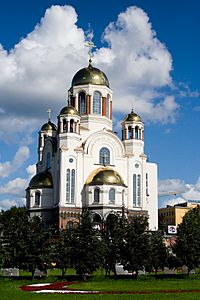
After the execution, Alexandra's body and the others were first thrown into a disused mine shaft. Later, they were moved and buried quickly under railway sleepers. The bodies of two children, Alexei and one of his sisters (Maria or Anastasia), were not found until 2007.
In the early 1990s, after the fall of the Soviet Union, most of the Romanov bodies were found. They were identified using DNA analysis. A blood sample from Prince Philip, Duke of Edinburgh (a grandson of Alexandra's sister) helped identify Alexandra and her daughters.
Alexandra, Nicholas II, three of their daughters, and the servants were reburied. This ceremony took place on 17 July 1998, 80 years after their deaths. They were laid to rest in the Peter and Paul Cathedral in Saint Petersburg.
Sainthood
In 1981, Alexandra and her family were recognized as martyrs by the Russian Orthodox Church Outside Russia. In 2000, the Russian Orthodox Church declared Alexandra a saint. She is known as a passion bearer, along with her husband Nicholas II, their children, and her sister Grand Duchess Elisabeth Feodorovna.
Images for kids
See also
 In Spanish: Alejandra Fiódorovna Románova para niños
In Spanish: Alejandra Fiódorovna Románova para niños
 | Delilah Pierce |
 | Gordon Parks |
 | Augusta Savage |
 | Charles Ethan Porter |


